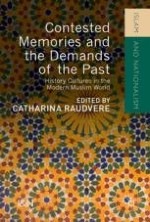2017 | OriginalPaper | Chapter
Experience and Expression: Aleksandar Hemon, Fiction, and (Dis)placement
Author : Catharina Raudvere
Published in: Contested Memories and the Demands of the Past
Publisher: Springer International Publishing
Activate our intelligent search to find suitable subject content or patents.
Select sections of text to find matching patents with Artificial Intelligence. powered by
Select sections of text to find additional relevant content using AI-assisted search. powered by
